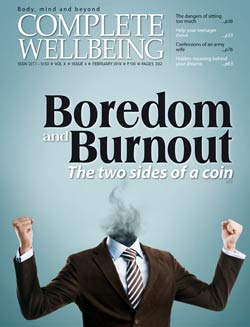
Abhishek Sohni looked stressed out. He had confided in his counsellor Ravi Mazumdar that lately he just couldn’t get himself to focus on his work. Abhishek loved to work; he was the driven type who regularly went beyond the call of his duty. Over the years, he had become known for his work ethic: the guy who never complained about excess work. Not surprisingly he had risen up the ranks quite early in his career.
How could someone like Abhishek suddenly lose all interest in his job? At first Ravi thought it was a case of exhaustion. After all, that is what his symptoms—lethargy, lack of focus and a general disinterest at work—pointed to. But digging deeper he discovered that the cause of Abhishek’s increasing sense of dissatisfaction was not excessive stress but the lack of it. The work that once challenged him now made him weary. He no longer derived any sense of satisfaction from his job, so much so that he had started thinking of retirement although he was only 44. Abhishek was suffering from a different kind of burnout, a phenomenon that results from boredom and lack of eustress or beneficial stress.
We tend to associate the term “burnout” with too much work-related stress. But this is a limited view of a much broader phenomenon. In this issue’s cover story, Dr Steven Berglas tells us the other side of the burnout story—when lack of enough stress and paucity of challenges leads to extended boredom which, in turn, causes burnout. According to him, no matter how good you are at your job and how much you enjoy doing something, after a while you will get bored of doing the same thing over and over again.
Giving examples of athletes who compete against top competitors, salespeople who exceed quotas, and managers who beat deadlines, he says, “Humans are innately challenge-hungry organisms who are rewarded [at a neurological level] by doing something ‘better’ every day… however, should an Olympic-calibre athlete compete against a high school student in his preferred sport, or a salesman reach his annual quota in a few months simply by filing orders from repeat customers, neither individual will derive eustress.”
One could say that true happiness and bliss result from good stress, which absorbs our attention thoroughly and makes us feel worthy. On the other hand, not being challenged enough is bound to make you feel disengaged, causing boredom which ultimately leads to burnout. He calls such burnout Supernova Burnout.
While explaining the concept of Supernova Burnout in detail, Dr Berglas offers a few unique techniques to address it, should you face such a problem in your life. Use these techniques to keep boredom in check while finding new ways to keep your work stimulating and challenging. Because, monotony isn’t good for your wellbeing.

